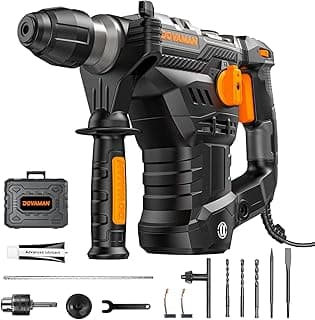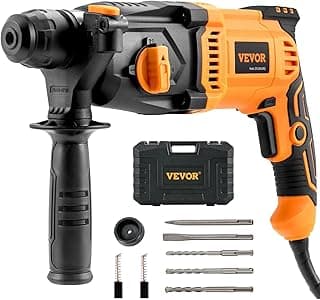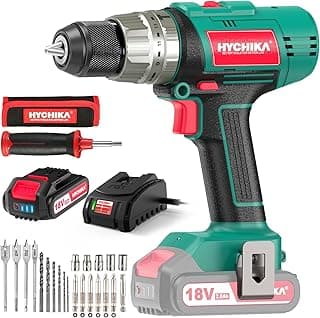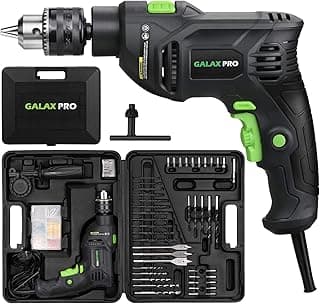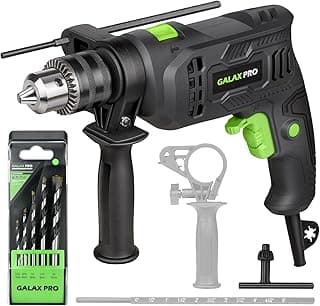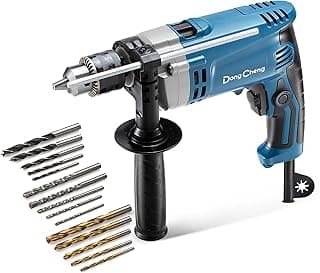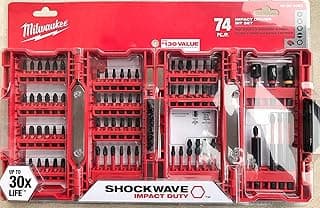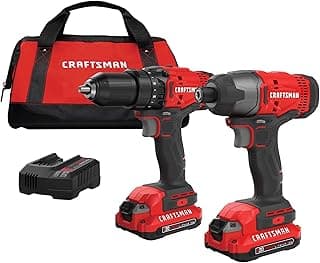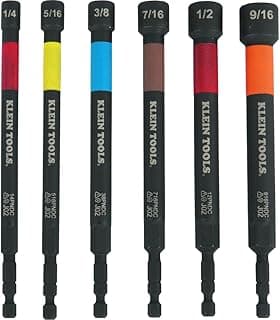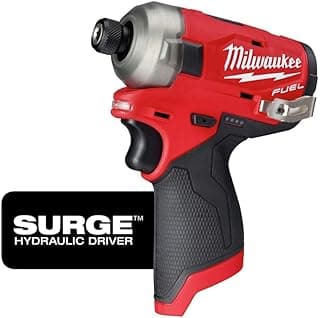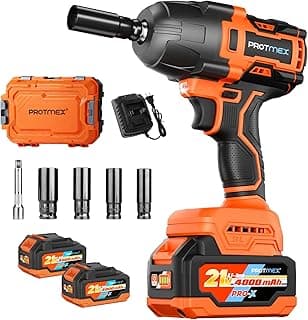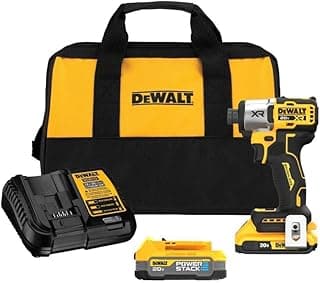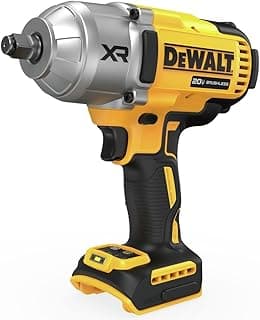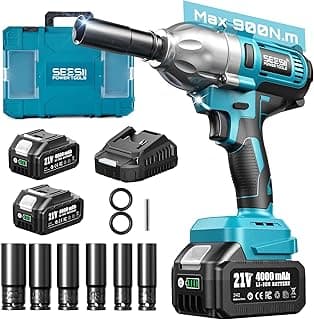Top Picks
Best Heavy-Duty Performance: RH15A 1-9/16'' SDS-Plus Rotary Hammer Drill
The DOVAMAN RH15A 1-9/16" SDS-Plus Rotary Hammer Drill is built for demanding jobs that require consistent power and precision. Its 12.5 Amp motor delivers up to 5.2 ft-lbs of impact energy, making it capable of drilling through concrete, metal, and wood with ease. The four operation modes allow users to switch between drilling, hammer drilling, chiseling, and chisel position adjustment for maximum flexibility. The upgraded vibration damping system enhances comfort during prolonged use, while the safety clutch and efficient heat dissipation design ensure durability and user protection.
From a professional standpoint, the RH15A stands out for its strong combination of power, versatility, and safety features. While it may be heavier than cordless options, users appreciate its stability and consistent torque during heavy-duty applications.
The RH15A offers excellent performance for its price range, making it a solid choice for professionals and DIY enthusiasts who need a dependable corded rotary hammer for concrete and masonry work.
Best Compact Power: Dong Cheng 20V Brushless Heavy-duty Impact Drill
The Dong Cheng 20V Brushless Heavy-duty Impact Drill combines efficiency and versatility in a lightweight cordless design. Delivering up to 443 in-lbs of torque and 27,000 IPM, it handles a wide range of drilling and driving applications, including brick, metal, and wood. Its 3-in-1 functionality with dual-speed settings ensures smooth performance whether you’re drilling, screwdriving, or hammering. The 1/2-inch metal chuck provides secure bit retention, while the 20+1+1 clutch enhances precision and control. At just 2 lbs, it’s designed for comfort and reduced fatigue during extended use.
Experts note that the Dong Cheng 20V drill strikes a solid balance between portability and performance. It’s particularly appreciated for its efficient brushless motor and ergonomic build, though it’s not the top choice for intensive concrete drilling compared to higher-torque models.
Overall, the Dong Cheng 20V Brushless Impact Drill offers excellent value for users seeking a compact, durable, and multi-purpose cordless hammer drill. It’s ideal for home improvement, light masonry, and professional maintenance tasks that demand reliability without excess weight.
Best Value Performance: VEVOR 1 Inch SDS-Plus Rotary Hammer Drill
The VEVOR 1-Inch SDS-Plus Rotary Hammer Drill is a reliable corded power tool built for tough concrete, masonry, and metalwork projects. Featuring an 8 Amp motor that delivers 2.4J of impact energy, it offers strong drilling performance with speeds up to 1470 RPM and 5200 BPM. The four-function selector allows users to easily switch between drilling, hammer drilling, chiseling, and chisel position adjustment. Its SDS-Plus chuck system ensures quick bit changes, while the 360° adjustable handle improves comfort and control during operation. The heat-resistant motor and efficient cooling system help extend the tool’s lifespan.
From a professional standpoint, the VEVOR rotary hammer is an excellent choice for users seeking a balance of power, functionality, and affordability. Its durable build and multiple operation modes make it versatile enough for both home renovation and professional applications. While the corded design limits mobility, it provides consistent power ideal for extended heavy-duty use.
Overall, the VEVOR 1-Inch SDS-Plus Rotary Hammer Drill offers impressive performance and durability at a budget-friendly price. It’s a dependable option for anyone needing a versatile rotary hammer for drilling and chiseling concrete or masonry with consistent efficiency.
FAQs
What brand makes the best hammer drill?
There isn’t a single “best” brand for everyone — the right choice depends on your priorities (power, durability, battery ecosystem, price, or service). That said, a few manufacturers consistently stand out:
-
DeWalt — Known for rugged, worksite-ready tools and a huge 20V/60V battery ecosystem. Great for pros who need reliability, parts availability, and service networks.
-
Makita — Reputation for smooth, well-engineered motors and good ergonomics; excellent brushless options and a broad cordless system that works well for tradespeople who value balance and longevity.
-
Milwaukee — Focused on performance and innovation (especially brushless motors and electronics). Strong choice for heavy trade use and for users who want the latest battery/tool tech.
-
Bosch / Hilti / Metabo HPT — Bosch has strong European engineering and consistent quality; Hilti is premium, aimed at contractors who need extreme reliability and on-site support; Metabo HPT (formerly Hitachi) offers good value and durability.
Bottom line: pick the brand whose battery platform you want to invest in, check local service/warranty support, and match the model to the work you do (light DIY vs. daily trade use).
Is 21V more powerful than 18V?
Voltage alone doesn’t tell the whole story. In simple terms, higher voltage can allow a tool to deliver more torque and power, but real-world performance depends on multiple factors:
-
Nominal vs. marketing voltage: Many battery systems use marketing names (e.g., “20V Max”) even though cell chemistry and nominal voltages differ. A “21V” battery may be only slightly higher in nominal voltage than an “18V” pack — the difference is usually small.
-
Battery capacity (Ah): A higher amp-hour (Ah) rating often matters more for runtime and sustained power than a small difference in voltage.
-
Motor & electronics: Brushless motors, better motor controllers, and gearbox design can dramatically improve usable power and efficiency regardless of a couple volts difference.
-
Application: For drilling into masonry or driving large fasteners, the tool’s torque output and hammer mechanism design are what matter most, not the nominal voltage label.
Conclusion: a 21V label doesn’t automatically mean noticeably more power than 18V. Compare torque, motor type (brushless vs brushed), and battery Ah for a better sense of performance.
Are DeWalt or Makita drills better?
Both DeWalt and Makita make excellent drills — “better” comes down to priorities:
-
DeWalt strengths: Durable construction, aggressive product refreshes, excellent availability of parts and accessories, and broad representation in North America. If you want a tool that can take abuse, is easy to service, and has many kit options, DeWalt is often the go-to.
-
Makita strengths: Smooth feel, often lighter and better balanced, strong brushless motor implementations, and a reputation for quieter operation and refined ergonomics. Makita can feel more “polished” in handling and is favored by users who spend long hours on the tool.
Practical advice: If you already own batteries from one of these ecosystems, sticking with it usually makes sense. Otherwise, decide by testing feel on the job, comparing spec sheets for torque/speed, and weighing warranty/service options where you live.
Which is better, SDS Plus or SDS Max?
SDS Plus and SDS Max are two common shank systems for rotary hammers — each is optimized for different job sizes:
-
SDS Plus: Designed for light-to-medium demolition and drilling (common on 1/2" to ~1–1/8" bits). SDS Plus hammers are lighter, more compact, and ideal for most contractors and serious DIYers who drill anchors, rebar holes, or occasional small chiseling. Most 1/2" hammer drills use SDS Plus.
-
SDS Max: Built for heavy-duty drilling and demolition with larger diameter bits and chisels. SDS Max tools are larger, deliver more impact energy, and are used when drilling big holes or for prolonged chiseling and concrete removal on construction sites.
Which to choose? If your work is general concrete anchoring, remodels, or mixed trade tasks, SDS Plus is the practical choice. If you frequently drill large holes or do heavy demolition, SDS Max is the right system. Note: adapters exist, but they reduce efficiency — picking the correctly sized system for your typical workload is the best route.

